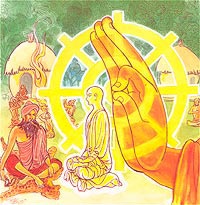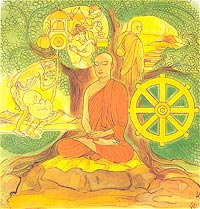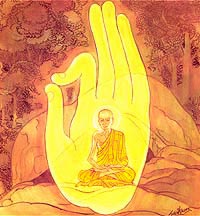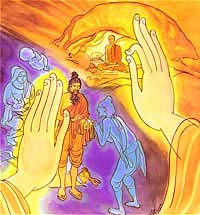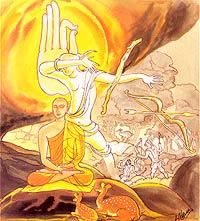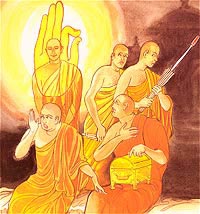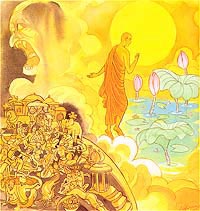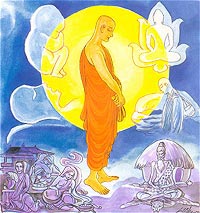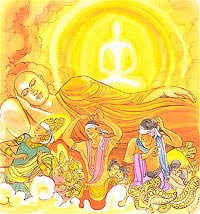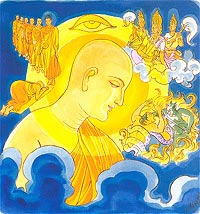07 03 2012 LESSON 546
TheDhammapada Verses and Stories Dhammapada Verses 95 Sariputtatthera Vatthu Arahats Are Noble Verse 393 Jatilabrahmana Vatthu One Does Not Become A
Brahmin Merely By Birth 383 Pasadabahulabrahmana
Vatthu Be A Knower Of The Deathless Verse
384 Sambahulabhikkhu Vatthu Cultivate Concentration Verse
385 Mara Vatthu The Unfettered Person Is A Brahmana
Verse 386 Annatarabrahmana Vatthu Who Is Contemplative And
Pure Is A Brahmin Verse 387 Anandatthera Vatthu The Buddha Shines Day And Night Verse 388 Annatarabrahmana Pabbajita Vatthu He
Who Had Discarded All Evil Is Holy Verses 389 and 390 Sariputtatthera
Vatthu Harm Not An Arahat An Arahat Does Not Retaliate Verse
391 Mahapajapatigotami Vatthu The Well-Restrained Is Truly A Brahmin Verse 392 Sariputtatthera Vatthu Honour To Whom Honour Is Due 394
Kuhakabrahmana Vatthu Be Pure Within Verse 395 Kisagotami
Vatthu Who Meditates Alone in the Forest Is A Brahmana Verse 396 Eka Brahmana
Vatthu Non-Possessive And The Non-Attached Person Is A Brahmana Verse
397 Uggasenasetthiputta Vatthu A Brahmana Is He Who Has Destroyed All Fetters Verse
398 Dve Brahmana Vatthu A Brahmana Is He Who Has No Hatred Verse 399 Akkosakabharadvaja Vatthu A Brahmana Is He Who Is Patient Verse
400 Sariputtatthera Vatthu A Brahmana Is He Who Is Not Wrathful Verse
401 Uppalavanna Theri Vatthu He Is A Brahmana Who Clings Not To Sensual
Pleasures Verse 402 Annatarabrahmana
Vatthu A Brahmana Is He Who Has Laid The Burden Aside Verse
403 Khemabhikkhuni Vatthu A Brahmana Is He Who Has Reached His Ultimate Goal Verse
404 Pabbharavasitissatthera Vatthu A Brahmana Is He Who Has No Intimacy With
Any Verse 405 Annatarabhikkhu Vatthu A Brahmana Is He Who Is Absolutely Harmless Verse
406 Samaneranam Vatthu A Brahmana Is He Who Is Friendly Amongst The Hostile Verse 407 Mahapanthakatthera
Vatthu A Brahmana Is He Who Has Discarded All Passions Verse
408 Pilindavacchatthera Vatthu A Brahmana Is He Who Gives Offence To None Verse
409
Annataratthera Vatthu A Brahmana Is He Who Steals Not Verse 410 Sariputtatthera
Vatthu A Brahmana Is He Who Is Desireless Verse 411 Mahamoggallanatthera
Vatthu In Whom There Is No Clinging Verse 412
Revatatthera Vatthu Learning The Charm Verse 413 Candabhatthera
Vatthu Learning The Charm Verse 414
Sivalitthera Vatthu The Tranquil Person Verse 415 Sundarasamuddatthera
Vatthu Freed From Temptation Verse
416* Jatilatthera Vatthu The Miracle Rings Verse 417 Nataputtakatthera
Vatthu Beyond All Bonds Verse 418 Nataputtakatthera Vatthu The Person
Whose Mind Is Cool Verses 419 and 420 Vangisatthera Vatthu Diviner Of Rebirth Destroy
Unknown Dhammadinna Theri Vatthu He
Yearns For Nothing Verse 422 Angulimatthera Vatthu He Who Is Rid Of Defilements Verse
423 Devahitabrahmana Vatthu The Giver And Receiver Of Alms
FREE
ONLINE eNlandā Research & Practice
UNIVERSITY & BUDDHIST GOOD NEWS LETTER Through http://sarvajan.ambedkar.org
THE BUDDHIST ON LINE GOOD
NEWS LETTER
COURSE PROGRAM
LESSONS 546
Practice a Sutta a Day
Keeps Dukkha Away
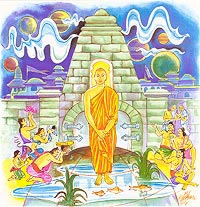
Verse 95. Arahats Are Noble
Like earth is one who’s
well-behaved,
secure and not resentful,
as city-post, as filth-free lake,
no wanderings-on for One Who’s Thus.
Explanation: The noble Arahats never
lose their temper whatsoever is done to them. They are firm and unshaken as the
gate-pillars that secure the city gates. They are as lucid and tranquil as the
ocean and the lakes devoid of mud. That kind of person ceases to wander in the
round of existence - samsara.
Dhammapada Verse 95
Sariputtatthera Vatthu
Pathavisamo no virujjhati
indakhilupamo tadi subbato
rahadova apetakaddamo1
samsara na bhavanti tadino.
Verse 95: Like the earth,
the arahat is patient and is not provoked to respond in anger; like the
door-post he is firm; he is unperturbed by the ups and downs of life; he is
serene and pure like a lake free from mud. For such an arahat there will be no
more rebirth.
1. apetakaddamo:
free from mud. The lake water being free from mud is unpolluted; the arahat
being free from defilements is also serene and pure.
The Story of Thera
Sariputta
While residing at the
Jetavana monastery, the Buddha uttered Verse (95) of this book, with reference
to the Chief Disciple Sariputta and a young bhikkhu.
It was the end of the
vassa; and Thera Sariputta was about to set out on a journey with some
followers. A young bhikkhu, who bore some grudge against the thera, approached
the Buddha and falsely reported that Thera Sariputta had abused him and beaten
him. The Buddha therefore sent for the thera and questioned him, and Thera
Sariputta replied as follows: “Venerable Sir! How could a bhikkhu, who
steadfastly keeps his mind on the body, set out on a journey without
apologizing, after doing wrong to a fellow bhikkhu? I am like the earth, which
feels no pleasure when flowers are cast on it, nor resentment when rubbish and
excreta are piled upon it. I am also like the door-mat, the beggar, the bull
with broken horns; I also feel abhorrence for the impurity of the body and am
no longer attached to it.”
When Thera Sariputta
spoke thus, the young bhikkhu felt very much distressed and wept bitterly, and
admitted that he had lied about the Chief Disciple Sariputta. Then the Buddha
advised Thera Sariputta to accept the apology of the young bhikkhu, lest a
heavy punishment should fall on him and get his head crushed. The young bhikkhu
then admitted that he had done wrong and respectfully asked for pardon. Thera
Sariputta pardoned the young bhikkhu and also asked to be forgiven if he also
had done any wrong.
All those present talked
in praise of Thera Sariputta, and the Buddha said, “Bhikkhus, a bhikkhu
like Sariputta has no anger or ill will in him. Like the earth and the
door-post, he is patient, tolerant, and firm; like the lake free from mud, he
is serene and pure.”
Then the Buddha spoke in
verse as follows:
|
Verse 95: Like the earth, the arahat is patient and is not
Verse By birth one is no brahmin, Explanation: One does not become a brahmin by one’s matted hair. Dhammapada Na jatahi na gottena Verse 393: Not by wearing matted hair, nor by lineage, nor by 1. sacca: the Four Noble Truths. 2. dhamma : the nine Transcendentals, viz., the four Maggas, the The Story of Jatila, the Brahmin While residing at the Jetavana monastery, the Buddha uttered Verse Once, a brahmin ascetic thought to himself that the Buddha called Then the Buddha spoke in verse as follows:
|
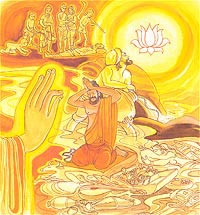
Verse 383. Be A Knower Of
The Deathless
O
brahmin, strive and cleave the stream,
desires of sense discarded,
knowing conditioned things decay
be Knower-of-the-Uncreated.
Explanation:
Exert all you can and cut off the stream of existence. Get rid of passion. Get
to know the erosion of the condition things. And, they become the knower of the
uncreated - Nibbana.
Dhammapada Verse 383
Pasadabahulabrahmana Vatthu
Chinda
sotam parakkamma
kame panuda brahmana
sankharanam khayam natva
akatannusi brahmana.
Verse
383: O Brahmana, cut off the stream of craving with diligence, and abandon
sense desires. O Brahmana, perceiving the cessation of the conditioned, be an
arahat who realizes Nibbana, the Unconditioned.
The
Story of a Brahmin Who Had Great Faith
While
residing at the Jetavana monastery, the Buddha uttered Verse (383) of this
book, with reference to a brahmin, who showed extreme devotion to some
bhikkhus.
Once,
in Savatthi, there lived a brahmin who became extremely devoted to the Buddha
and his Teaching, after hearing a discourse given by the Buddha. Every day, he
invited the bhikkhus to his house for alms-food. When the bhikkhus arrived at
his house, he addressed them as “arahats” and respectfully requested
them to enter his house. When thus addressed, the puthujjana bhikkhus and the
arahats felt embarrassed and they decided not to go to the brahmin’s house the
next day.
When
the brahmin found that the bhikkhus did not come to his house again he felt
unhappy. He went to the Buddha and told him about the bhikkhus not coming to
his house. The Buddha sent for those bhikkhus and asked for explanation. The
bhikkhus told the Buddha about the brahmin addressing all of them as arahats.
The Buddha then asked them whether they felt any false pride and undue elation
when they were thus addressed. The bhikkhus answered in the negative. To them
the Buddha said, “Bhikkhus, if you don’t feel any false pride and undue
elation when addressed as arahats, you are not guilty of breaking any of the
rules of discipline of the bhikkhus. The fact is that the brahmin addressed you
so because he was extremely devoted to the arahats. So. my sons, you should
strive hard to get rid of craving and attain arahatship.”
Then
the Buddha spoke in verse as follows:
|
Verse 383: O Brahmana,
Verse 384. Cultivate When Explanation: |
Dhammapada Verse 384
Sambahulabhikkhu Vatthu
Yada
dvayesu dhammesu
paragu hoti brahmano
athassa sabbe samyoga
attham gacchanti janato.
Verse
384: When the brahmana is well-established in the two dhammas (i.e., the
practice of Tranquillity and Insight Meditation), then, in that knowing one,
all fetters are destroyed.
The
Story of Thirty Bhikkhus
While
residing at the Jetavana monastery, the Buddha uttered Verse (384) of this
book, with reference to thirty bhikkhus.
On one
occasion, thirty bhikkhus came to pay homage to the Buddha. The Venerable
Sariputta, seeing that time was ripe and proper for those bhikkhus to attain
arahatship, approached the Buddha and asked a question, solely for the benefit
of those bhikkhus. The question was this: “What are the two dhammas?”
To this the Buddha replied, “Sariputta! Tranquillity and Insight
Meditation are the two dhammas.”
Then
the Buddha spoke in verse as follows:
|
Verse 384: When the |
At the
end of the discourse all the thirty bhikkhus attained arahatship.
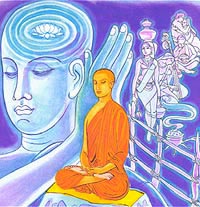
Verse 385. The Unfettered
Person Is A Brahmana
For
whom is found no near or far,
for whom’s no near or far,
free of fear and fetter-free,
that one I call a Brahmin True.
Explanation:
To him there is no further shore. To him there is no near shore. To him both
these shores are non-existent. He is free of anxiety and is freed of bonds.
That person I describe as a Brahmana.
Dhammapada Verse 385
Mara Vatthu
Yassa
param aparam va
paraparam na vijjati
Vitaddaram visamyuttam
tamaham brumi brahmanam.
Verse
385: Him I call a brahmana who has for him neither this shore (i.e., the
sense-bases) nor the other shore (i.e., the sense objects), and who is
undistressed and free from moral defilements1.
1.
‘This shore’ and ‘the other shore’ are used in the sense of the internal and
the external ayatanas. The internal ayatanas are the sense bases, viz, the eye,
the ear, the nose, the tongue, the body and the mind; the external ayatanas are
the sense objects, viz., visible object, sound, odour, taste, touch and
mind-object.
For a
true Brahmana (i.e., arahat) there is neither ‘this shore’ nor ‘the other
shore’ which means that the senses of the arahat are calmed, and his passions
extinguished.
The
Story of Mara
While
residing at the Jetavana monastery, the Buddha uttered Verse (385) of this
book, with reference to Mara.
On one
occasion, Mara came to the Buddha disguised as a man and asked him,
“Venerable Sir, You often say the word ‘param’. What is the meaning of
that word?” The Buddha, knowing that it was Mara who was asking that
question, chided him, “O wicked Mara! The words ‘param’ and ‘aparam’
have nothing to do with you. ‘Param’ which means ‘the other shore’ can be
reached only by the arahats who are free from moral defilements.”
Then
the Buddha spoke in verse as follows:
|
Verse 385: Him I call a |
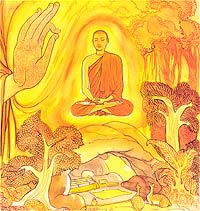
Verse 386. Who Is
Contemplative And Pure Is A Brahmin
Seated
stainless, concentrated,
who’s work is done, who’s free of taints,
having attained the highest aim,
that one I call a Brahmin True.
Explanation:
He is given to concentrated contemplation. He is free of all blemishes - the
dust that defiles a being. He sits in solitude. All his spiritual tasks and obligations
are done. He has reached the highest goal. That person I describe as a brahmana
Dhammapada Verse 386
Annatarabrahmana Vatthu
Jhayim
viraja’ masinam
katakicca’ manasavam
uttamattha’ manuppattam
tamaham brumi brahmanam.
Verse
386: Him I call a brahmana, who dwells in seclusion practising Tranquility and
Insight Meditation and is free from taints (of moral defilements); who has
performed his duties, and is free from moral intoxicants (asavas) and has
reached the highest goal (arahatship).
The
Story of a Certain Brahmin
While
residing at the Jetavana monastery, the Buddha uttered Verse (386) of this
book, with reference to a brahmin.
One
day, a brahmin thought to himself, “Gotama Buddha calls his disciples
‘brahmana’. I also am a brahmin by caste. Shouldn’t I also be called a
brahmana?” So thinking, he went to the Buddha and posed this question. To
him the Buddha replied, “I do not call one a brahmana simply because of
his caste; I only call him a brahmana, who has attained arahatship.”
Then
the Buddha spoke in verse as follows:
|
Verse 386: Him I call a |
At the
end of the discourse the brahmin attained Sotapatti Fruition.
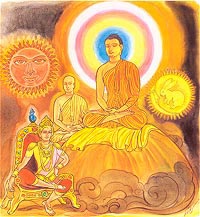
Verse 387. The Buddha Shines Day And Night
The sun is bright by day,
the moon enlights the night,
armoured shines the warrior,
contemplative the Brahmin True.
But all day and night-time too
resplendent does the Buddha shine.
Explanation: The sun
shines during the day. The moon beams at night. The warrior glows only when he
has his armour on. The brahmana shines when he is concentrated on contemplation.
All these people have various times to shine. But the Buddha is radiant all day
and all night through his Enlightenment.
Dhammapada Verse 387
Anandatthera Vatthu
Diva tapati adicco
ratti mabhati candima
sannaddho khattiyo tapati
jhayi tapati brahmano
atha sabbamahorattim
buddho tapati tejasa.
Verse 387: By day shines
the sun; by night shines the moon; in regalia shines the king; in meditation
shines the arahat; but the Buddha in his glory shines at all times, by day and
by night.
The Story of Thera Ananda
While residing at the
Pubbarama monastery, the Buddha uttered Verse (387) of this book, with
reference to the Venerable Ananda.
It was the full moon day
of the seventh month (Assayuja) when King Pasenadi of Kosala came to visit the
Buddha. The king was then resplendent in his full royal regalia. At that time,
Thera Kaludayi was also present in the same room sitting at the edge of the
congregation. He was in deep mental absorption (jhana), his body bright and
golden. In the sky, the Venerable Ananda noticed that the sun was setting and
the moon was just coming out, both the sun and the moon radiating rays of
light.
The Venerable Ananda
looked at the shining splendour of the king, of the thera, and of the sun and
the moon. Finally, the Venerable Ananda looked at the Buddha and he suddenly
perceived that the light that was then radiating from the Buddha far surpassed
the light shining from the others. Seeing the Buddha in his glory and
splendour, the Venerable Ananda immediately approached the Buddha and burst
forth, “O Venerable Sir! The light that shines forth from your noble body
far surpasses the light from the king, the light from the thera, the light from
the sun and the light from the moon.”
To him the Buddha spoke
in verse as follows:
|
Verse 387: By day shines the sun; by night |
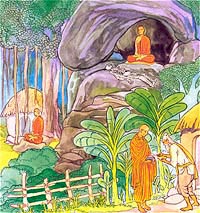
Verse 388. He Who Had Discarded All Evil Is Holy
By barring-out badness a ‘brahmin’ one’s
called
and one is a monk by conduct serene,
banishing blemishes out of oneself
therefore one’s known as ‘one who has left home’.
Explanation: One who has got rid of sinful
action is called brahmana. One of serene senses is called samana. A person is
called pabbajita because he has done away with all his faults.
Note: brahmano, samano, pabbajito: a brahmin,
a monk a wandering ascetic. These are all categories of priests in the
religious landscape of the Buddha’s day. They pursued a multitude of religious
paths. Here the Buddha explains who a real priest, monk or a brahmin is.
Dhammapada Verse 388
Annatarabrahmana Pabbajita Vatthu
Bahitapapoti brahmano
samacariya1 “samano” ti
vuccati
pabbajayamattano malam
tasma “pabbajito2” ti vuccati.
Verse 388: Because he has discarded evil he is
called a ‘brahmana’; because he lives calmly he is called a ’samana’; and
because he gets rid of his impurities he is called a ‘pabbajita’.
1. samacariya: lit., living calmly, i.e.,
practising for eradication of moral defilements.
2. pabbajita: one who leaves the household
life for the homeless life of a recluse; in Buddhism it means one who has given
up the impurities of the household life to become a bhikkhu.
The Story of a Brahmin Recluse
While residing at the Jetavana monastery, the
Buddha uttered Verse (388) of this book, with reference to a brahmin ascetic.
Once there was a brahmin ascetic in Savatthi.
One day, it occurred to him that the Buddha called his disciples pabbajita
bhikkhus and since he also was a recluse, he should also be called a pabbajita.
So he went to the Buddha and posed the question why he should not be called a
pabbajita. The Buddha’s answer to him was this: “Just because one is a
recluse one does not automatically become a pabbajita; a pabbajita must have
other qualifications also.”
Then the Buddha spoke in verse as follows:
|
Verse 388: Because he has discarded evil he is called a |
At the end of the discourse the brahmin
attained Sotapatti Fruition.
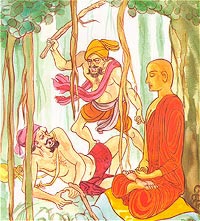
Verse 389. Harm Not An Arahat
One should
not a brahmin beat
nor for that should He react.
Shame! Who would a Brahmin beat,
more shame for any should they react.
Explanation:
No one should strike a brahmana - the pure saint. The brahmana who has become a
victim must refrain from attacking the attacker in return, or show anger in
return. Shame on him who attacks a brahmana; greater shame on him who displays
retaliatory anger.
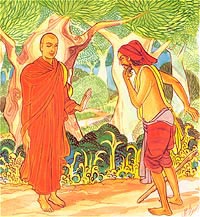
Verse 390. An Arahat Does Not
Retaliate
For brahmin
no small benefit
when mind’s aloof from what is dear.
As much he turns away from harm
so much indeed does dukkha die.
Explanation:
To the brahmana, the act of not returning hate is not a minor asset - it is a
great asset, indeed. If, there is in a mind which usually takes delight in
hateful acts, there is a change for the better, it is not a minor victory. Each
time the violent mind ceases, suffering, too, subsides.
Dhammapada Verses 389 and 390
Sariputtatthera Vatthu
Na
brahmanassa pahareyya
nassa muncetha brahmano
dhi brahmanassa hantaram
tato dhi yassa muncati.
Na
brahmanasse’ tadakinci seyyo
yada nisedho manaso piyehi
yato yato himsamano nivattati
tato tato sammatimeva dukkham.
Verse 389:
One should not strike a brahmana; a brahmana should not get angry with his
assailant; it is shameful to strike a brahmana; it is more shameful to get
angry with one’s assailant.
Verse 390:
For a brahmana there is no benefit at all if he does not restrain from anger to
which his mind is prone. Inasmuch as one desists from the intention to harm, to
that extent dukkha ceases.
The Story
of Thera Sariputta
While
residing at the Jetavana monastery, the Buddha uttered Verses (389) and (390)
of this book, with reference to the Venerable Sariputta.
The
Venerable Sariputta was often praised by many people for his patience and
forbearance. His pupils usually said of him thus: “Our teacher is a man of
great patience and extreme endurance. If he is abused or even beaten by others,
he does not lose his temper but remains calm and composed.” As this was
often said of the Venerable Sariputta, a brahmin holding wrong views declared
to the admirers of Sariputta that he would provoke the Venerable Sariputta into
anger. At that moment, the Venerable Sariputta, who was on his alms-round,
appeared on the scene; the brahmin went after him and hit him hard on his back
with his hand. The thera did not even look round to see who was the person that
attacked him, but proceeded on his way as if nothing had happened. Seeing the
magnanimity and great fortitude of the noble thera, the brahmin was very much
shaken. He got down on his knees at the feet of the Venerable Sariputta,
admitted that he had wrongfully hit the thera, and asked for pardon. The
brahmin then continued, “Venerable Sir, should you forgive me, kindly come
to my house for alms-food.”
In the
evening, other bhikkhus reported to the Buddha that the Venerable Sariputta had
gone for alms-food to the house of a brahmin who had beaten him. Further, they
observed that the brahmin was sure to get bolder and he would soon be
assaulting other bhikkhus also. To those bhikkhus, the Buddha replied,
“Bhikkhus, a true brahmana does not beat another true brahmana; only an
ordinary man or an ordinary brahmin would beat an arahat in anger and ill will.
This ill will should be eradicated by Anagami Magga.”
Then the
Buddha spoke in verse as follows:
|
Verse |
|
Verse |
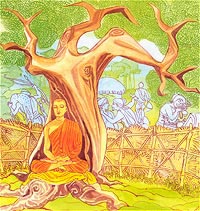
Verse 391. The
Well-Restrained Is Truly A Brahmin
In whom
there is no wrong-doing
by body, speech or mind,
in these three ways restrained,
that one I call a Brahmin True.
Explanation:
If an individual is well guarded in body, speech and in mind, and has done no
wrong in these three areas, who is well restrained, I call that person a true
brahmana - the noble saint.
Dhammapada Verse 391
Mahapajapatigotami Vatthu
Yassa
kayena vacaya
manasa natthi dukkatam
samvutam tihi thanehi
tamaham brumi brahmanam.
Verse
391: Him I call a brahmana who does no evil in deed or word or thought, who is
restrained in these three respects.
The
Story of Theri Mahapajapati Gotami
While
residing at the Jetavana monastery, the Buddha uttered Verse (391) of this
book, with reference to Theri Mahapajapati Gotami.
Mahapajapati
Gotami was the stepmother of Gotama Buddha. On the death of Queen, seven days
after the birth of Prince Siddhattha, Mahapajapati Gotami became the chief
queen of King Suddhodana. At that time, her own son Nanda was only five days
old. She let her own son be fed by a wet-nurse, and herself fed Prince
Siddhattha, the future Buddha. Thus, Mahapajapati Gotami was a great benefactor
to Prince Siddhattha.
When
Prince Siddhattha returned to Kapilavatthu after the attainment of Buddhahood,
Mahapajapati Gotami went to see the Buddha and requested that women should also
be allowed to enter the Buddhist Order as bhikkhunis; but the Buddha refused
permission. Later, King Suddhodana died after attaining arahatship. Then, while
the Buddha was sojourning at the Mahavana forest near Vesali, Mahapajapati,
accompanied by five hundred ladies, came on foot from Kapilavatthu to Vasali.
They had already shaven their heads and had put on the dyed robes. There, for a
second time, Mahapajapati requested the Buddha to accept women in the Buddhist
Order. The Venerable Ananda also interceded on her behalf. So, the Buddha
complied, with the proviso that Mahapajapati abides by eight special conditions
(garudhammas). Mahapajapati undertook to observe the garudhammas as required,
and the Buddha admitted her into the Order. Thus, Mahapajapati was the first to
be admitted to the Order of the Bhikkhunis. The other women were admitted to
the Order after her by the bhikkhus as instructed by the Buddha.
In
course of time, it came to the minds of some bhikkhunis that Mahapajapati
Gotami had not been properly admitted as a bhikkhuni because she did not have a
preceptor; therefore, Mahapajapati Gotami was not a true bhikkhuni. With this
thought in their mind, they stopped doing sabbath (uposatha) ceremonies and
vassa (pavarana) ceremonies with her. They went to the Buddha and posed the
problem of Mahapajapati Gotami not having been properly admitted to the Order
of bhikkhunis as she had no preceptor. To them the Buddha replied, “Why
do you say so? I myself gave the eight garudhammas to Mahapajapati and she had
learnt and practised the garudhammas as required by me. I myself am her
preceptor and it is quite wrong for you to say that she has no preceptor. You
should harbour no doubt whatsoever about an arahat.”
Then
the Buddha spoke in verse as follows:
|
Verse 391: Him I call a |
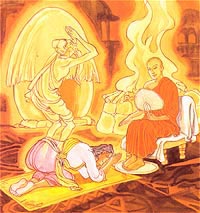
Verse 392. Honour To Whom
Honour Is Due
From whom one knows the Dhamma
by Perfect Buddha taught
devoutly one should honour them
as brahmin sacred fire.
Explanation: If a seeker after truth were to learn the Word of
the Enlightened One from a teacher, that pupil must pay the Teacher due
respect, like a brahmin paying homage assiduously and with respect to the
sacrificial fire.
Dhammapada Verse 392
Sariputtatthera Vatthu
Yamha dhammam vijaneyya
sammasambuddhadesitam
sakkaccam tam namasseyya
aggihuttamva brahmano.
Verse 392: If from somebody one should learn the Teaching of the
Buddha, he should respectfully pay homage to that teacher, as a brahmin
worships the sacrificial fire.
The Story of Thera Sariputta
While residing at the Jetavana monastery, the Buddha uttered
Verse (392) of this book, with reference to the Venerable Sariputta.
The Venerable Sariputta was born of brahmin parents of Upatissa
village; that was why he was named Upatissa. His mother was Sari. His very
close friend was Kolita, another brahmin youth, son of Moggali. Both the youths
were searching for the right doctrine, which would lead them to liberation from
the round of rebirths, and both of them had a great desire to enter a religious
Order. First, they went to Sancaya, but they were not satisfied with his
teaching. Then they wandered all over Jambudipa looking for a teacher who would
show them the way to the Deathless, but their search was fruitless. After some
time, they parted company but with the understanding that the one who found the
true dhamma first should inform the other.
About that time, the Buddha arrived at Rajagaha with a company
of bhikkhus, including Thera Assaji, one of the group of the first Five
Bhikkhus (Pancavaggis). While Thera Assaji was on an alms-round, Upatissa saw
the thera and was very much impressed by his noble countenance. So Upatissa
respectfully approached the thera and asked who his teacher was, what doctrine
his teacher taught, and also briefly to explain the doctrine to him. Thera
Assaji then told Upatissa about the arising of the Buddha and about his sojourn
at the Veluvana monastery in Rajagaha. The thera also quoted a short stanza
connected with the Four Noble Truths.
The verse runs thus:
Ye dhamma hetuppa bhava
tesam hetum tathagato aha
tesanca yo nirodho
evam vadi maha samano.
It means:
The Tathagata has declared the cause and also the cessation of
all phenomena which arise from a cause. This is the doctrine held by the Great
Samana.
When the verse was only half-way through, Upatissa attained
Sotapatti Fruition.
As promised, Upatissa went to his friend Kolita to inform him
that he had found the true dhamma. Then the two friends, accompanied by two
hundred and fifty followers, went to the Buddha who was then at Rajagaha. When
they arrived at the Veluvana monastery, they asked permission to enter the
Buddhist Order, and both Upatissa and Kolita, together with their two hundred
and fifty followers, were admitted as bhikkhus. Upatissa, son of Sari, and
Kolita, son of Moggali, then came to be known as Sariputta and Moggallana. Soon
after their admission to the Order, the Buddha expounded to them a dhamma and
the two hundred and fifty bhikkhus attained arahatship; but Moggallana and
Sariputta attained arahatship only at the end of seven days and fifteen days
respectively. The reason for the delay in their attainment of arahatship was
that they had made a wish for Chief Discipleship, which required much more
striving to achieve perfection.
The Venerable Sariputta always remembered that he had been able
to meet the Buddha and attain the Deathless through the Venerable Assaji. So,
he always paid obeisance in the direction where his teacher was and he always
went to bed with his head lying in the same direction. Other bhikkhus who were
staying with him at the Jetavana monastery misinterpreted his actions and said
to the Buddha, “Venerable Sir! The Venerable Sariputta still worships the
various directions, viz., the East, the South, the West, the North, the Nadir
and the Zenith, as he has done before as a brahmin youth; it seems as if he has
not yet given up his old beliefs.” The Buddha sent for the Venerable
Sariputta and Sariputta explained to the Buddha that he was only paying
obeisance to his teacher, the Venerable Assaji, and that he was not worshipping
the various directions. The Buddha was satisfied with the explanation given by
the Venerable Sariputta and said to the other bhikkhus, “Bhikkhus! The
Venerable Sariputta was not worshipping the various directions; he was only
paying obeisance to his teacher and benefactor, through whom he had attained
the Deathless. It is quite right and proper for him to pay homage to such a
teacher.”
Then the Buddha spoke in verse as follows:
|
Verse |
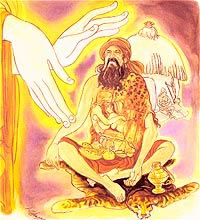
Verse 394. Be Pure
Within
What’s
the coiled hair for?
For what your cloak of skins?
Within you are acquisitive,
you decorate without.
Explanation:
Of what use are your exterior sights of asceticism: you matted hair, your
leopard skin garment? Your outside you keep clean and bright, while inside you
are filled with defilements.
Dhammapada Verse 394
Kuhakabrahmana Vatthu
Kim
te jatahi dummedha
kim te ajinasatiya
abbhantaram te gahanam
bahiram parimajjasi.
Verse
394: O foolish one! What is the use of wearing matted hair? What is the use of
your wearing a garment made of antelope skin? In you, there is a forest (of
moral defilements); you clean yourself only externally.
The
Story of a Deceitful Brahmin
While
residing at the Kutagara monastery in Vesali, the Buddha uttered Verse (394) of
this book, with reference to a deceitful brahmin.
Once,
a deceitful brahmin climbed up a tree near the city-gate of Vesali and kept
himself hanging upside down like a bat from one of the branches of the tree.
From this very awkward position, he kept on muttering, “O people! Bring me
a hundred heads of cattle, many pieces of silver and a number of slaves. If you
do not bring these to me, and if I were to fall down from this tree and die,
this city of yours will surely come to ruin.” The people of the town,
fearing that their city night be destroyed if the brahmin were to fall down and
die, brought all the things he demanded and pleaded with him to come down.
The
bhikkhus hearing about this incident reported to the Buddha and the Buddha
replied that the deceitful one could only cheat the ignorant people but not the
wise ones.
Then
the Buddha spoke in verse as follows:
|
Verse 394: O
Verse 395. Who One enduring rag-robes, lean, Explanation: He wears robs made of cast off rags. He is so |
Dhammapada Verse 395
Kisagotami Vatthu
Pamsukuladharam jantum
kisam dhamanisanthatam
ekam vanasmim jhayantam
tamaham brumi brahamanam.
Verse
395: Him I call a brahmana who wears robes made from rags (picked up from a
dust heap), who is lean with veins standing out, who meditates alone in the
forest.
The
Story of Kisagotami
While
residing at the Gijjhakuta hill, the Buddha uttered Verse (395) of this book,
with reference to Kisagotami.
On one
occasion, Sakka, king of the devas, came with his followers to pay homage to
the Buddha. At the same lime, Theri Kisagotami, by her supernormal power came
through the sky to pay homage to the Buddha. But when she saw Sakka and his
entourage paying homage to the Buddha, she retreated. Sakka seeing her, asked
the Buddha who the lady was, and the Buddha replied, “O Sakka! She is
my daughter Kisagotami. Once, she came to me in sorrow and distress through the
loss of her son and I made her see the impermanent, the unsatisfactory and the
non-self nature of all conditioned things. As a consequence of that she
attained Sotapatti Fruition, joined the Order, and became an arahat. She is one
of my eminent female disciples and is matchless in the ascetic practice of wearing
robes made from rags collected from a dust heap.”
Then
the Buddha spoke in verse as follows:
|
Verse 395: Him I call a
Verse 396. I Explanation: |
Dhammapada Verse 396
Eka Brahmana Vatthu
Na caham brahmanam brumi
yonijam mattisambhavam,
bhovadi1 nama so hoti
sace hoti sakincano
akincanam anadanam
tamaham brumi brahmanam.
Verse 396: I do not call him
a brahmana just because he is born from the womb of a brahmana mother. He is
just a bhovadi brahmin if he is not free from moral defilements. Him I call a
brahmana, who is free from moral defilements and from attachment.
1. bhovadi: ‘Bho’ is a
familiar term of address used to inferiors and equals. The epithet ‘bhovadi’,
therefore, implies arrogance. Brahmins usually addressed the Buddha as ‘Bho
Gotama!’ The term ‘bhovadi’ is applied reproachfully by the Buddhists to the
brahmins.
The Story of a Brahmin
While residing at the
Jetavana monastery, the Buddha uttered Verse (396) of this book, with reference
to a brahmin.
Once, a brahmin from
Savatthi thought that since the Buddha called his disciples ‘brahmanas’, he
should also be called a ‘brahmana’ because he was born of brahmin parents. When
he told the Buddha about this, the Buddha replied to him, “O brahmin! I
do not call him a brahmana just because he is born of brahmin parents. I call
him a brahmana only if he is free from moral defilements and cut off all
clinging to existence.”
Then the Buddha spoke in
verse as follows:
|
Verse 396: I do not |
At the end of the
discourse that brahmin attained Sotapatti Fruition.
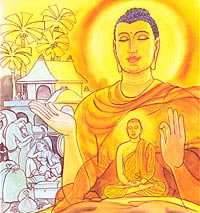
Verse 397. A Brahmana Is
He Who Has Destroyed All Fetters
Who
fetters all has severed
does tremble not at all,
who’s gone beyond all bond, unyoked,
that one I call a Brahmin True.
Explanation:
He has got rid of all fetters; in consequence, he is free of trepidation and is
fearless. He has travelled beyond all bonds. Disengaged from bonds, he is no
longer tied to the world. Such a person I describe as a brahmana.
Dhammapada Verse 397
Uggasenasetthiputta Vatthu
Sabbasamyojanam
chetva
yo ve na paritassati
sangatigam visamyuttam
tamaham brumi brahamanam.
Verse
397: Him I call a brahmana, who has cut off all fetters and is fearless, who is
beyond attachment and is free from moral defilements.
The
Story of Uggasena, the Son of a Rich Man*
While
residing at the Jetavana monastery, the Buddha uttered Verse (397) of this
book, with reference to Uggasena, son of a rich man.
After
marrying a dancer from a theatrical troupe, Uggasena was trained by his
father-in-law who was an acrobat, and became very skilful in acrobatics. One
day while he was demonstrating his skill, the Buddha came on the scene. After
hearing the Buddha’s teaching, Uggasena attained arahatship while he was still
performing his feats on top of a long bamboo pole. After that, he climbed down
from the pole and pleaded with the Buddha to accept him as a bhikkhu and was
accordingly admitted into the Order.
One day,
when other bhikkhus asked him whether he did not have any feeling of fear while
climbing down from such a great height (i.e., about ninety feet), he answered
in the negative. The bhikkhus took that to mean that Uggasena was claiming to
have attained arahatship even then. So, they went to the Buddha and said,
“Venerable Sir! Uggasena claims himself to be an arahat; he must be
telling lies.” To them the Buddha replied, “Bhikkhus, one who has
cut off all fetters, like my son Uggasena, has no fear.”
Then
the Buddha spoke in verse as follows:
|
Verse 397: Him I call a |
* Cross
Reference: Verse 348: The Story of Uggasena, Chapter XXIV.
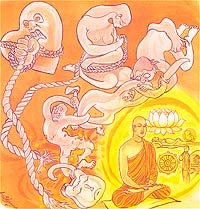
Verse 398. A Brahmana Is
He Who Has No Hatred
When
cutting strap and reins,
the rope and bridle too,
tipping the shaft, he’s Waked,
that one I call a Brahmin True.
Explanation:
He has got rid of the strap of ill-will. He has freed himself from the thong of
craving. He has escaped the large shackle breaking all its links. These are the
false views that curb the people. He has taken off the cross-bar of ignorance.
He has become aware of the four noble truths. That person, I describe as a
brahmana.
Dhammapada Verse 398
Dve Brahmana Vatthu
Chetva
naddhim varattanca
sandanam sahanukkamam
ukkhittapaligham buddham
tamaham brumi brahamanam.
Verse
398: Him I call a brahmana, who has cut the strap (of ill will), the thong (of
craving) and the cord (of wrong views together with latent defilements), who
has lifted the bar that fastens the door (of ignorance), and who knows the
Truth.
The
Story of Two Brahmins
While
residing at the Jetavana monastery, the Buddha uttered Verse (398) of this
book, with reference to two brahmins.
Once
there lived in Savatthi two brahmins, each of whom owned a bullock. Each
claimed that his bullock was better and stronger. At last, they agreed to put
their animals to a test. So they went to the bank of the Aciravati River and
there they filled up a cart with sand. One after the other, the bullocks pulled
the cart, but they only pulled in vain, because the cart, did not move and only
the ropes broke off. The bhikkhus seeing this reported to the Buddha and the
Buddha said to them, “Bhikkhus! It is easy to break off the straps
which you can see with your eyes; anyone can break them or cut them. But my
sons, a bhikkhu should cut the strap of ill will and the thong of craving which
are within you and which bind you.”
|
Verse 398: Him I call a |
At the
end of the discourse five hundred bhikkhus attained arahatship.
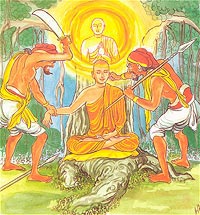
Verse 399. A Brahmana Is He
Who Is Patient
Who angerless endures abuse.
Beating and imprisonment,
with patience’s power, an armed might:
that one I call a Brahmin True.
Explanation: He is abused and insulted. He is tortured, imprisoned
and bound up. But he endures all these without being provoked or without losing
his temper. Such an individual who has patience as his power and his army, I
describe as a true brahmano.
Dhammapada Verse 399
Akkosakabharadvaja Vatthu
Akkosam vadhabandhanca
aduttho yo titikkhati
khantibalam balanikam
tamaham brumi brahmanam.
Verse 399: Him I call a brahmana, who, without anger endures abuse,
beating and being bound, and to whom the strength of patience is like the
strength of an army.
The Story of the Abusive Brahmin Brothers
While residing at the Veluvana monastery, the Buddha uttered Verse
(399) of this book, with reference to the abusive Bharadvaja brothers.
Once there was a brahmin, whose wife was in the habit of blurting
out a string of words whenever she sneezed or when something or someone touched
her unawares. One day, the brahmin invited some of his friends to a meal and
suddenly she blurted out some words. Since she was a Sotapanna, the words
“Namo tassa bhagavato arahato sammsambhuddassa” automatically
came out of her mouth. These words of veneration to the Buddha were very much
disliked by her husband, the brahmin. So, in anger, he went to the Buddha
hoping to put some challenging questions to the Buddha. His first question was,
“What do we have to kill to be able to live happily and peacefully?”
and his second question was, “Killing of what dhamma do you approve
of?” To these questions, the Buddha replied, ” O brahmin, to be
able to live happily and peacefully, one will have to kill ill will (dosa).
Killing one’s ill will is liked and praised by the Buddhas and the
arahats.” After hearing the Buddha, the brahmin was so impressed and
satisfied with the answer that he asked to be permitted to enter the Order.
Accordingly, he entered the Order and later became an arahat.
This brahmin had a brother who was very notorious for his abusive
words and was known as Akkosaka Bharadvaja, the abusive Bharadvaja. When
Akkosaka Bharadvaja heard that his brother had joined the Order of the
bhikkhus, he was furious. He went straight away to the monastery and abused the
Buddha. The Buddha in his turn asked, “O brahmin, let us suppose you
offered some food to some guests and they left the house without taking the
food. Since the guests did not accept your food, to whom would that food
belong?” To this question the brahmin answered that the food would be
his. On receiving that answer, the Buddha said, “In the same way, O
brahmin, since I do not accept your abuse, the abuse would only go back to
you.” Akkosaka Bharadvaja instantly realized the sagacity of those
words and he felt a great respect for the Buddha. He also entered the Order and
in due course became an arahat.
After Akkosaka Bharadvaja had entered the Order, his two younger
brothers also came to see the Buddha with the same intention of abusing the
Buddha. They too were made to see the light by the Buddha and they also, in
their turn, entered the Order. Eventually, both of them became arahats.
One evening, at the congregation of the bhikkhus, the bhikkhus said
to the Buddha, “O how wonderful and how great are the virtues of the
Buddha! The four brahmin brothers came here to abuse the Buddha; instead of
arguing with them, he made them see the light, and as a result, the Buddha has
become a refuge to them.” To them, the Buddha replied, “Bhikkhus!
Because I am patient and forbearing, and do no wrong to those who do me wrong,
I have become a refuge to many.”
Then the Buddha spoke in verse as follows:
|
Verse 399: Him I call a |
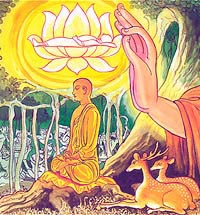
Verse 400. A Brahmana Is
He Who Is Not Wrathful
Who’s
angerless and dutiful,
of virtue full and free of lust,
who’s tamed, to final body come,
that one I call a Brahmin True.
Explanation:
He is free of anger. He carefully performs his religious duties and is mindful
of the observances. He is disciplined in terms of virtuous behaviour. He is
restrained. This is the final body he will occupy as he has ended his cycle of
births. I call that person a brahmana.
Dhammapada Verse 400
Sariputtatthera Vatthu
Akkodhanam
vatavantam
silavantam anussadam
dantam antimasariram1
tamaham brumi brahmanam.
Verse
400: Him I call a brahmana, who is free from anger, who practises austerity,
who is virtuous and free from craving, who is controlled in his senses and for
whom this body (i.e., existence) is the very last.
1.
antimasariram: lit., one who has the last body. This is his last body because
he will not be reborn; he is an arahat.
The
Story of Thera Sariputta
While
residing at the Veluvana monastery, the Buddha uttered Verse (400) of this
book, with reference to the Venerable Sariputta.
While
the Buddha was in residence at the Veluvana monastery, the Venerable Sariputta,
accompanied by five hundred bhikkhus, entered Nalaka Village and stood at the
door of the house of his own mother for alms-food. His mother invited them into
the house. But while she was offering food to her son she said, “O you
consumer of left-overs, you who have abandoned eighty crores to become a
bhikkhu, you have ruined us.” Then, she offered alms-food to the other
bhikkhus and said to them rudely, “You all have used my son as your
attendant; now eat your food.” The Venerable Sariputta said nothing in
reply but he just meekly took his bowl and came back to the monastery. Back at
the monastery, the bhikkhus told the Buddha how the Venerable Sariputta had
patiently borne the scolding and abuses of his mother. To them, the Buddha said
that arahats never get angry, they never lose their temper.
Then
the Buddha spoke in verse as follows:
|
Verse 400: Him I call a |
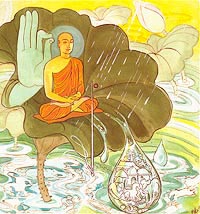
Verse 401. He Is A
Brahmana Who Clings Not To Sensual Pleasures
Like
water on a lotus leaf,
or mustard seed on needle point,
whoso clings not to sensual things,
that one I call a Brahmin True.
Explanation:
The water does not get attached to the surface of the lotus leaf. The mustard
seed does not get attached to the point of a needle. In the same way, the wise
one’s mind does not get attached to sensual pleasure. Such a non-attached
person I describe as the true brahmana .
Dhammapada Verse 401
Uppalavanna Theri Vatthu
Vari
pokkharapatteva
araggeriva sasapo
yo na limpati kamesu
tamaham brumi brahmanam.
Verse
401: Him I call a brahmana, who does not cling to sensual pleasures, just as
water does not cling to a lotus leaf, or the mustard seed to the tip of an awl.
The
Story of Theri Uppalavanna*
While
residing at the Jetavana monastery, the Buddha uttered Verse (401) of this
book, with reference to Theri Uppalavanna.
Once,
some bhikkhus were talking about the arahat Theri Uppalavanna being molested by
the young Nanda who was then swallowed up by the earth. In this connection,
they asked the Buddha whether arahats do not enjoy sensual pleasures as they
have the same physical make-up like any other people. To them the Buddha
replied, “Bhikkhus! Arahats do not enjoy sensual pleasures; they do not
indulge in sensual pleasures, for they do not cling to objects of sense and to
sensual pleasures, just as water does not cling to the lotus leaf or the
mustard seed to the tip of an awl.”
Then
the Buddha spoke in verse as follows:
|
Verse 401: Him I call a |
* This
story is the continuation of the story given in Verse 69: The Story of Theri Uppalavanna, Chapter V.
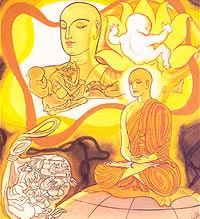
Verse 402. A Brahmana Is
He Who Has Laid The Burden Aside
Whoso
in this world comes to know
cessation of all sorrow,
laid down the burden, freed from bonds,
that one I call a Brahmin True.
Explanation:
He has become aware, in this world itself, the end of suffering. He is
unburdened: he has put down the load. He has got disengaged from the bonds that
held him. I call that person a true brahmana.
Dhammapada Verse 402
Annatarabrahmana Vatthu
Yo dukkhassa pajanati
idheva khayamattano
pannabharam visamyuttam
tamaham brumi brahmanam.
Verse 402: Him I call a brahmana, who even in
this existence realizes the end of dukkha (i.e., Nibbana), who has laid down
the burden (of the khandhas) and who is free from moral defilements.
The Story of a Certain Brahmin
While residing at the Jetavana monastery, the
Buddha uttered Verse (402) of this book, with reference to a certain brahmin,
whose slave became an arahat.
Once, there was a young slave of a brahmin.
One day, fleeing from the house of his master he joined the Order of the
bhikkhus, and in due course, he attained arahatship. On one occasion, while he
went on an alms-round with the Buddha, his former master, the brahmin, saw him
and grabbed him firmly by the robe. When the Buddha asked what the matter was,
the brahmin explained that the young bhikkhu was his slave at one time. To him
the Buddha said, “This bhikkhu has laid down the burden (of the
khandhas).” The brahmin took that to mean that his slave had become an
arahat. So to make sure, he asked the Buddha whether it was true that the young
bhikkhu had become an arahat, and the Buddha confirmed his statement.
Then the Buddha spoke in verse as follows:
|
Verse 402: Him I call a brahmana, who even in this existence |
At the end of the discourse the brahmin
attained Sotapatti Fruition.
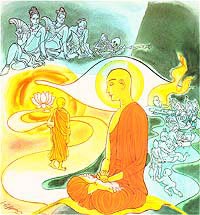
Verse 403. A Brahmana Is
He Who Has Reached His Ultimate Goal
Whose
knowledge is deep, who’s wise,
who’s skilled in ways right and wrong,
having attained the highest aim,
that one I call a Brahmin True.
Explanation:
He possesses profound wisdom. He is full of insight. He is capable of
discriminating the right path from the wrong path. He has reached the highest
state. I call that person a true brahmana.
Dhammapada Verse 403
Khemabhikkhuni Vatthu
Gambhirapannam
medhavim
maggamaggassa kovidam1
uttamattha manuppattam
tamaham brumi brahmanam.
Verse
403: Him I call a brahmana, who is wise and is profound in his knowledge, who
knows the right way from the wrong way, and who has attained the highest goal
(i.e., arahatship).
1.
maggamaggassa kovidam: skilful in differentiating the right way from the wrong
way, i.e., knowledge of what does and what does not lead to the realization of
Nibbana.
The
Story of Theri Khema*
While
residing at the Gijjhakuta hill, the Buddha uttered Verse (403) of this book,
with reference to Theri Khema.
One
night, Sakka, king of the devas, came with his followers to pay homage to the
Buddha. While they were with the Buddha, Theri Khema, by her supernormal power,
also came through the sky to pay homage to the Buddha. But because Sakka and
his company were there with the Buddha, she just paid obeisance to the Buddha,
and soon left him. Sakka asked the Buddha who that bhikkhuni was and the Buddha
replied, “She is one of my pre-eminent disciples; she is known as Theri
Khema. She is matchless amongst the bhikkhunis in wisdom and she knows how to
differentiate the right way from the wrong way.”
Then
the Buddha spoke in verse as follows:
|
Verse 403: Him I call a |
* See
also Verse 347: The Story of Theri Khema, Chapter XXIV.
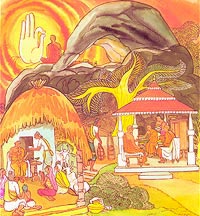
Verse 404. A Brahmana Is
He Who Has No Intimacy With Any
Aloof
alike from laity
and those gone forth to homelessness,
who wanders with no home or wish,
that one I call a Brahmin True.
Explanation:
He does not establish extensive contact either with laymen or with the
homeless. He is not attached to the way of life of the householder. He is
content with the bare minimum of needs. I call that person a true brahmana.
Dhammapada Verse 404
Pabbharavasitissatthera Vatthu
Asamsattham
gahatthehi
anagarehi cubhayam
anokasari mappiccham
tamaham brumi brahmanam.
Verse
404: Him I call a brahmana, who associates not with the householder or with the
homeless one, or with both, who is free from sensual desire and has few wants.
The
Story of Thera Tissa
While
residing at the Jetavana monastery, the Buddha uttered Verse (404) of this book
with reference to Thera Tissa.
Thera
Tissa, after taking a subject of meditation from the Buddha, went to a mountain
side. There, he found a cave which suited him and he decided to spend the three
months of the rainy season (vassa) in that cave. So he stayed in the cave and
went to the village for alms-food every morning. In the village, there was a
certain elderly woman who regularly offered him alms-food. In the cave, there
also lived the guardian spirit of the cave. As the thera was one whose practice
of morality was pure, the cave-spirit dared not live in the same cave with the
noble thera; at the same time, he did not have the courage to ask the thera to
leave the place. So he thought of a plan that would enable him to find fault
with the thera and thus cause him to leave the cave.
The
cave-spirit possessed the son of the elderly woman from the house where the
thera usually went for his alms-food. He caused the boy to behave in a very
peculiar way, turning his head backwards, and rolling his wide open eyes. His
mother got alarmed and was in tears. The cave-spirit, who possessed the boy,
then said “Let your teacher, the thera, wash his feet with water and pour
that water on the head of your son.” The next day when the thera came to
her house for alms-food, she did as she was advised by the cave-spirit and the
boy was left in peace. The cave-spirit went back to the cave and waited at the
entrance for the return of the thera. When the thera returned from his
alms-round, the cave-spirit revealed himself and said, “I am the spirit
guarding this cave. O you physician, do not enter this cave.” The thera
knew that he had lived a clean life from the day he had become a thera, so he
replied that he did not remember practising medicine. Then the cave-spirit
accused him that in that very morning he had cured a young boy possessed by an
ogre at the house of the elderly woman. But the thera reflected that it was
not, in fact, practising medicine and he realized that even the cave spirit
could find no other fault with him. That gave him a delightful satisfaction (piti)
with himself, and abandoning piti and concentrating hard on Insight
Meditation he attained arahatship then and there, while still standing at the
entrance to the cave.
As the
thera had now become an arahat, he advised the cave-spirit to leave the cave.
The thera continued to stay there till the end of the vassa, and then he
returned to the Buddha. When he told the other bhikkhus about his encounter
with the cave-spirit, they asked him whether he did not get angry with the
cave-spirit when he was forbidden to enter the cave. The thera answered in the
negative but they did not believe him. So they went to the Buddha and said,
“Thera Tissa claims himself to be an arahat ; he is not speaking the
truth.” To them the Buddha replied, “Bhikkhus, my son Tissa was
speaking the truth when he said he did not get angry. He has indeed become an
arahat he is no longer attached to anyone; he has no occasion to get angry with
anyone nor any need to associate with others.”
Then
the Buddha spoke in verse as follows:
|
Verse 404: Him I call a
Verse Who blows to beings has renounced Explanation: He has discarded the rod and set aside the |
Dhammapada Verse 405
Annatarabhikkhu Vatthu
Nidhaya dandati bhutesu1
tasesu thavaresu2 ca
yo na hanti na ghateti
tamaham brumi brahmanam.
Verse 405: Him I call a brahmana, who has laid aside the use of
force towards all beings, the perturbed as well as the unperturbed (i.e.,
arahats), and who does not kill or cause others to kill.
1. Nidhaya dandati bhutesu: has laid aside the use of the stick
towards all beings.
2. tasesu thavaresu: the perturbed and the unperturbed. The
perturbed are those who still have craving and are therefore easily shaken. The
unperturbed are those who have given up craving and are therefore firm and
tranquil; they are the arahats.
The Story of a Certain Bhikkhu
While residing at the Jetavana monastery, the Buddha uttered Verse
(405) of this book, with reference to a certain bhikkhu.
Once, a bhikkhu after taking a subject of meditation from the
Buddha went to a forest to practise meditation. After he had attained
arahatship he came back to the Buddha to offer his deep and profound gratitude
to the Buddha. On his way, he passed through a village. Just as he was going
through the village, a woman having quarreled with her husband came out of her
house and followed the bhikkhu. The husband coming after his wife, seeing her
behind the bhikkhu, thought that the bhikkhu was taking his wife away. So he
shouted at the bhikkhu and threatened to beat him. His wife entreated him not
to beat the bhikkhu, but that made him more furious. As a result, the thera was
beaten black and blue by the husband. After beating the bhikkhu to his heart’s
content, he took away his wife along with him and the bhikkhu continued on his
way.
On arrival at the Jetavana monastery, other bhikkhus saw the
bruises over the whole body of the bhikkhu and they attended to his bruises.
When they asked him if he did not get angry with the man who had beaten him so
sorely, he answered in the negative. So the other bhikkhus went to the Buddha
and reported that the bhikkhu had falsely claimed to have attained arahatship. To
them the Buddha replied, “Bhikkhus! Arahats have laid aside the stick
and the sword. They do not get angry even if they are beaten.” Thus,
the Buddha confirmed that the bhikkhu had, indeed, become an arahat.
Then the Buddha spoke in verse as follows:
|
Verse
Verse 406. A Brahmana Is He Who Is Friendly Amongst The Hostile Among the hostile, friendly,
Verse 406. A Brahmana Among Explanation: |
Dhammapada Verse 406
Samaneranam Vatthu
Aviruddham
viruddhesu
attadandesu nibbutam
sadanesu anadanam
tamaham brumi brahmanam.
Verse
406: Him I call a brahmana, who is not hostile to those who are hostile, who is
peaceful (i.e., has laid aside the use of force) to those with weapons, and who
is without attachment to objects of attachment.
The
Story of Four Samaneras
While
residing at the Jetavana monastery, the Buddha uttered Verse (406) of this
book, with reference to four samaneras who were arahats.
Once,
the wife of a brahmin sent her husband the brahmin to the Jetavana monastery to
invite four bhikkhus to an alms-meal at their house. She told him to
specifically request for senior bhikkhus who were also true brahmanas. But four
seven year old arahat samaneras, viz., Samkicca, Pandita, Sopaka and Revata
were sent along with him. When his wife saw the young samaneras she was very
much dissatisfied and blamed the brahmin for bringing such young samaneras who
were even younger than her grandson. She was, in fact, furious with her
husband, and so she sent him back to the monastery to get older bhikkhus. In
the meantime she refused to give the young samaneras the higher seats reserved
for the bhikkhus; they were given lower seats and she did not offer them alms-food.
When
the brahmin arrived at the monastery, he met the Venerable Sariputta and
invited him to his house. When the Venerable Sariputta arrived at the house of
the brahmin, he saw the four young arahat samaneras and asked them if they had
been offered alms-food yet. On learning that the arahat samaneras had not been
given alms-food yet and also that food had been prepared only for four persons
the Venerable Sariputta returned to the monastery without accepting alms-food
from the house of the brahmin. So his wife sent the brahmin back again to the
monastery to get another senior bhikkhu. This time, the Venerable Maha
Moggallana came along with the brahmin, but he also returned to the monastery
without accepting alms-food when he learned that the young samaneras had not
been offered alms-food and also that food had been prepared only for four
persons.
By this
time, the samaneras were feeling hungry. Sakka, king of the devas, seeing the
state of things took the form of an old brahmin and came to the house. The brahmin
and his wife paid respect to the old brahmin and offered him a seat of honour,
but Sakka just sat on the ground and paid respect to the four samaneras. Then
he revealed that he was Sakka. Seeing that Sakka himself was paying respect to
the young samaneras, the brahmin couple offered alms-food to all the five.
After the meal, Sakka and the samaneras manifested their supernormal power by
going right up into the sky through the roof. Sakka went back to his celestial
abode, the samaneras returned to the monastery.
When
other bhikkhus asked the samaneras whether they did net get angry when the
brahmin couple refused to offer alms-food to them, they answered in the
negative. The bhikkhus not believing them reported to the Buddha that the four
young samaneras were falsely claiming to be arahats. To them the Buddha said, “Bhikkhus,
arahats bear no ill will towards those who are hostile to them.”
Then
the Buddha spoke in verse as follows:
|
Verse 406: Him I call a |
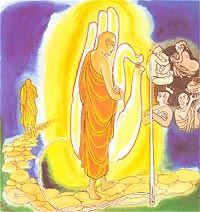
Verse 407. A Brahmana Is He
Who Has Discarded All Passions
From
whomever lust and hate,
conceit, contempt have dropped away,
as mustard seed from a point of a needle,
that one I call a Brahmin True.
Explanation:
His mind does not accept such evils as lust, ill-will, pride and ingratitude.
In this, his mind is like a point of a needle that just does not grasp a
mustard seed. An individual endowed with such a mind I describe as a brahmana.
Dhammapada Verse 407
Mahapanthakatthera Vatthu
Yassa rago
ca doso ca
mano makkho ca patito
sasaporiva aragga
tamaham brumi brahmanam.
Verse 407:
Him I call a brahmana, from whom passion, ill will, pride and detraction have
fallen off like a mustard seed from the tip of an awl.
The Story
of Thera Mahapanthaka
While
residing at the Veluvana monastery, the Buddha uttered Verse (407) of this
book, with reference to Thera Mahapanthaka, elder brother of Culapanthaka*.
Thera
Mahapanthaka was already an arahat when his younger brother Culapanthaka joined
the Order. Culapanthaka was born a dullard because he had made fun of a very
dull bhikkhu in one of his past existences. Culapanthaka could not even
memorize one verse in four months’ time. Mahapanthaka was disappointed with his
younger brother and asked him to leave the monastery as he was not worthy of
the Order.
It was in
this connection that, on one occasion, the bhikkhus asked the Buddha why
Mahapanthaka, even though he was an arahat, turned his younger brother
Culapanthaka out of the monastery. They also added “Do the arahats still
lose their temper? Do they still have moral defilements like ill will in
them?” To them the Buddha replied, “Bhikkhus! Arahats have no
moral defilements like passion and ill will in them. My son Mahapanthaka acted
as he did with a view to benefiting his brother and not out of ill will.”
Then the
Buddha spoke in verse as follows:
|
Verse 407: Him I call a |
* See also
Verse 25: The Story of Culapanthaka, Chapter II.
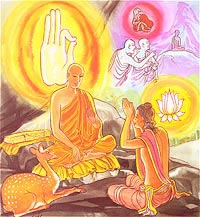
Verse 408. A Brahmana Is
He Who Gives Offence To None
Who
utters speech instructive,
true and gentle too,
who gives offence to none,
that one I call a Brahmin True.
Explanation:
His speech is true. His words are well-meaning, constructive and not harsh. By
his words he will not give offence to anyone. Nor will his words provoke
people. Such a person I declare a true brahmana.
Dhammapada Verse 408
Pilindavacchatthera Vatthu
Akakksam
vinnapanim
giram sacca’ mudiraye
yaya nahhisaje kanci
tamaham brumi brahmanam.
Verse
408: Him I call a brahmana, who speaks gentle, instructive and true words, and
who does not offend anyone by speech.
The
Story of Thera Pilindavaccha
While
residing at the Veluvana monastery, the Buddha uttered Verse (408) of this
book, with reference to Thera Vaccha, who was also known as Thera
Pilindavaccha, due to his offensive ways.
Thera
Pilindavaceha had a very offensive way of addressing people: he would often
say, “Come here, you wretch”, or “Go there, you wretch” and
such other things. Other bhikkhus reported about him to the Buddha. The Buddha
sent for him, and spoke to him on the matter. Then, on reflection the Buddha
found that for the past five hundred existences, the thera had been born only
in the families of the brahmins, who regarded themselves as being superior to
other people. So the Buddha said to the bhikkhus, “Bhikkhus! Thera
Vaccha addresses others as ‘wretch’ only by force of habit acquired in the
course of his five hundred existences as a brahmin, and not out of malice. He
has no intention of hurting others, for an arahat does not harm others.”
Then
the Buddha spoke in verse as follows:
|
Verse 408: Him I call a |
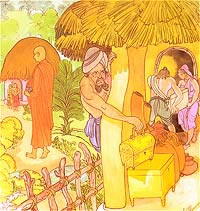
Verse 409. A Brahmana Is
He Who Steals Not
Who in
the world will never take
what is not given, long or short,
the great or small, the fair or foul,
that one I call a Brahmin True.
Explanation:
In this world if there is some person who does not take anything that is not
given, whether long or short, minute or large or good or bad, him I declare a
true brahmana.
Dhammapada Verse 409
Annataratthera Vatthu
Yo’dha
digham va rassam va
anum thulam subhasubham
Joke adinnam nadiyati
tamaham brumi brahmanam.
Verse
409: Him I call a Brahmana, who, in this world takes nothing that is not given
him, be it long or short, big or small, good or bad.
The
Story of a Certain Thera
While
residing at the Jetavana monastery, the Buddha uttered Verse (409) of this
book, with reference to a certain thera.
One
day, a brahmin from Savatthi put his upper garment outside his house to air it.
A thera found that garment as he was going back to the monastery. Thinking that
it was a piece of cloth thrown away by someone and therefore ownerless, the
thera picked it up. The brahmin looking out of his window saw the thera picking
up the piece of clothing and came after the thera, abusing and accusing him.
“You shaven head! You are stealing my clothing”, he said; the thera
promptly returned the piece of clothing to the brahmin.
Back at
the monastery, the thera related the above Incident to other bhikkhus, and they
made fun of him and jokingly asked him whether the cloth was long or short,
coarse or fine. To this question the thera answered, “Whether the clothing
is long or short, coarse or fine matters not to me; I am not at all attached to
it.” Other bhikkhus then reported to the Buddha that the thera was falsely
claiming himself to be an arahat. To them the Buddha replied, “Bhikkhus!
The thera speaks the truth; an arahat does not take anything that is not given
him.”
Then
the Buddha spoke in verse as follows:
|
Verse 409: Him I call a |
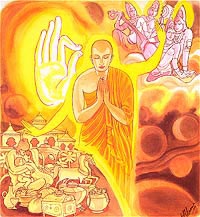
Verse 410. A Brahmana Is He Who Is Desireless
In whom there are no
longings found
in this world or the next,
longingless and free from bonds,
that one I call Brahmin True.
Explanation: He has no
yearnings either for this world or for the next. He is free from earning and
greed. He is disengaged from defilements. Such a person I declare a fine
brahmana.
Dhammapada Verse 410
Sariputtatthera Vatthu
Asa yassa na vijjanti
asmim loke paramhi ca
nirasasam visamyuttam
tamaham brumi brahmanam.
Verse 410: Him I call a
brahmana, who has no desire either for this world or for the next, who is free
from craving and from moral defilements.
The Story of Thera
Sariputta
While residing at the
Jetavana monastery, the Buddha uttered Verse (410) of this book, with reference
to Thera Sariputta.
On one occasion, Thera
Sariputta accompanied by five hundred bhikkhus went to a monastery near a small
village to spend the vassa. At the end of the vassa, Thera Sariputta wanted
robes for young bhikkhus and samaneras. So he said to the bhikkhus, “If
people come to offer robes, send them to me or inform me”; and then he
left for the Jetavana monastery to pay homage to the Buddha. Other bhikkhus misunderstood
Thera Sariputta’s instructions, and said to the Buddha, “Venerable Sir!
Thera Sariputta is still attached to material things like robes and other
requisites of a bhikkhu.” To them the Buddha replied, “Bhikkhus!
My son Sariputta has no more craving in him. He told you to bring the robes to
him, so that the chances to perform meritorious deeds may not decrease for
lay-disciples, and the chances to accept whatever they may properly receive may
not be reduced for young bhikkhus and samaneras.”
Then the Buddha spoke in
verse as follows:
|
Verse 410: Him I call a brahmana, who has no |
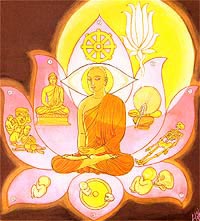
Verse 411. In Whom There
Is No Clinging
In whom
there is no dependence found,
with Final Knowledge freed from doubt,
who’s plunged into the Deathless depths,
that one I call a Brahmin True.
Explanation:
He has no attachments - no attachments can be discovered in him. He has no
spiritual doubts due to his right awareness, He has entered the deathless -
Nibbana. I describe him, a true brahmana.
Dhammapada Verse 411
Mahamoggallanatthera Vatthu
Yassalaya
na vijjanti
annaya akathamkathi
amatogadha’ manuppattam
tamaham brumi brahmanam.
Verse
411: Him I called a brahmana, who has no craving, who through knowledge of the
Four Noble Truths is free from doubt, and has realized Nibbana the Deathless.
The
Story of Thera Maha Moggallana
While
residing at the Jetavana monastery, the Buddha uttered Verse (411) of this
book, with reference to Thera Maha Moggallana.
On one
occasion, the bhikkhus told the Buddha about Thera Maha Moggallana the same
thing they had said of Thera Sariputta that he still had attachment to worldly
things. To them the Buddha said that Thera Maha Moggallana had discarded all
craving.
Then
the Buddha spoke in verse as follows:
|
Verse 411: Him I called |
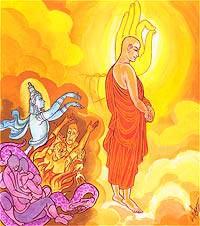
Verse 412. Above Both Good And Evil
Here who’s gone beyond both bonds
to goodness and evil too,
is sorrowless, unsullied, pure
that one I call a Brahmin True.
Explanation: If any person in this world has travelled beyond
both good and the bad, and the attachments, and if he is without sorrow, and is
bereft of blemishes, and is pure, him I describe as a true brahmana.
Dhammapada Verse 412
Revatatthera Vatthu
Yo’dha punnanca pipanca
ubho sanga’mupaccaga
asokam virajam suddham
tamaham brumi brahmanam.
Verse 412: Him I call a brahmana, who, in this world, has
transcended both ties good and evil; who is sorrowless and, being free from the
taints of moral defilements, is pure.
The Story of Samanera Revata
While residing at the Pubbarama monastery, the Buddha uttered
Verse (412) of this book, with reference to Samanera Revata.
One day, the bhikkhus said to the Buddha, “Revata is
getting many offerings from people, he is gaining fame and fortune. Even though
he lives alone in the forest, through supernormal power he has now built five
hundred pinnacled monasteries for five hundred bhikkhus.” To them the
Buddha said, “Bhikkhus, my son Revata has discarded all craving; he has
transcended both good and evil.”
|
Verse 412: Him I call a brahmana, who, in this world, has
Verse 413. Learning The Who, Explanation: Dhammapada Verse 413 Candamva vimalam suddham Verse 1. The While Candabha Then Meanwhile, Then the Buddha spoke in verse as follows:
|
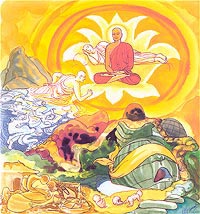
Verse 414. The Tranquil
Person
Who’s
passed this difficult path,
delusion’s bond, the wandering-on,
who’s crossed beyond , contemplative,
uncraving with no questioning doubt,
no clinging’s fuel so cool become,
that one I call a Brahmin true.
Explanation:
He has crossed over the quagmire of passion. He has gone beyond the difficult
terrain of blemishes, that is hard to traverse and has crossed the cycle of
existence. He is fully and totally reached the other shore. He is a meditator
and is bereft of craving. His spiritual doubts are resolved. He is no longer
given to grasping. He is cooled. Such a person I describe as a true brahmana.
Dhammapada Verse 414
Sivalitthera Vatthu
Yo’mam
palipatham duggam
samsaram mohamaccaga
tinno parangato jhayi
anejo akathamkathi
anupadaya nibbuto
tamaham brumi brahmanam.
Verse
414: Him I call a brahmana, who, having traversed this dangerous swamp (of
passion), this difficult road (of moral defilements), the ocean of life
(samsara) and the darkness of ignorance (moha), and having crossed the fourfold
Flood, has reached the other shore (Nibbana); who practises Tranquility and
Insight Meditation, who is free from craving and from doubt, who clings to
nothing and remains in perfect peace.
The
Story of Thera Sivali
While
residing in the Kundadhana forest near the city of Kundakoliya, the Buddha
uttered Verse (414) of this book, with reference to Thera Sivali.
Princess
Suppavasa of Kundakoliya was in pregnancy for seven years and then for seven
days she was in labour pains. She kept contemplating the unique qualities of the
Buddha, the Dhamma and the Samgha and in the end she sent her husband to the
Buddha to pay obeisance to him on her behalf and to inform him of her
condition. When informed of the condition of the princess, the Buddha said, “May
Suppavasa be free from danger and from sorrow; may she give birth to a healthy
noble son in safety.” As these words were being spoken, Suppavasa gave
birth to her son at her house. On that very day, soon after the birth of the
child, the Buddha and some bhikkhus were invited to the house. Alms-food was
offered there and the newly born child offered filtered water to the Buddha and
the bhikkhus. To celebrate the birth of the child, the parents invited the
Buddha and the bhikkhus to their house to offer food for seven days.
When
the child grew up he was admitted to the Order and as a bhikkhu he was known as
Sivali. He attained arahatship as soon as his head was shaved off. Later, he
became famous as the bhikkhu who received the largest amount of offerings. As a
recipient of offerings he was unsurpassed.
On one
occasion, the bhikkhus asked the Buddha why Sivali, with the qualifications to
become an arahat, was confined in his mother’s womb for seven years. To them
the Buddha replied, “Bhikkhus! In a previous existence, Sivali was the
son of a king who lost his kingdom to another king. In trying to regain their
kingdom he had besieged the city on the advice of his mother. As a result, the
people in the city were without food or water for seven days. It was for this
evil deed that Sivali was imprisoned in his mother’s womb for seven years. But
now, Sivali has come to the end of all dukkha; he has realized Nibbana.”
Then
the Buddha spoke in verse as follows:
|
Verse 414: Him I call a |
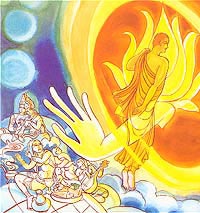
Verse 415. Freed From Temptation
Who has abandoned lusting here
as homeless one renouncing all,
with lust and being quite consumed,
that one I call a Brahmin True.
Explanation: Rejecting pleasure, homeless he goes
to life’s journey’s end. Him, I call a Brahmin True.
Dhammapada Verse 415
Sundarasamuddatthera Vatthu
Yo’dha kime
pahantvana
anagaro paribbaje
kamabhavaparikkhinam
tamaham brumi brahmanam.
Verse 415:
Him I call a brahmana, who, in this world, has given up sensual pleasures, and
leaving the home-life has become a bhikkhu; who has eradicated sensual desires
and has come to the end of existence.
The Story
of Thera Sundarasamudda
While
residing at the Jetavana monastery, the Buddha uttered Verse (415) of this
book, with reference to Thera Sundarasamudda.
Sundarasamudda
was the son of a rich man from Savatthi. After he had entered the Order, he
left for Rajagaha, which was forty-five yojanas away from Savatthi, to practise
meditation. One day, while some festivities were going on in Savatthi, the
parents of Sundarasamudda missed him very much; they also felt sorry for their
son who was missing all the enjoyment and they wept. As they were weeping, a
courtesan came to them and asked what the matter was. On hearing about their
son, the courtesan said, “If I could make your son leave the Order and
return to the life of a lay man how would you reward me?” The parents
answered that they would make her rich. The courtesan then asked for a large
sum of money and left for Rajagaha with a number of followers.
At
Rajagaha, she rented a house with seven-tiered pinnacles on the route where
Thera Sundarasamudda would come on his alms-round. She prepared good food and
waited for him. On the first few days, she offered alms-food to the thera at
the door of her house. Later, she invited him to come inside. Meanwhile, she
paid money to some children to come and play just outside the house about the
time the thera usually came on his alms-round. This gave her the excuse that it
was very dusty and noisy on the ground floor; with this excuse she invited the
thera to the top floor to have his alms-food. The thera consented and went up
and as soon as he had entered the room, the courtesan closed the door. Then she
started seducing the thera. She said to the thera, “Venerable Sir! Please
be my youthful and energetic husband, and I will be your dearly beloved wife.
After our long and happy wedded life we can both leave it to enter the Order
and strive our very best to attain Nibbana.” When he heard these words the
thera suddenly realized his mistake and got alarmed. Then he said to himself,
“Indeed, by being negligent and unmindful I have made a great
mistake.”
At that
instant, the Buddha saw from his Perfumed Chamber what was happening to Thera
Sundarasamudda at Rajagaha. He called the Venerable Ananda and said to him, “Ananda!
On an upper storey of a pinnacled building in Rajagaha, there now goes on a
struggle between Sundarasamudda and a courtesan; but in the end the thera will
be the winner.” After saying this to Ananda, the Buddha sent forth his
radiance to the thera, made him feel his presence, and said, “My son!
Be resolute and get rid of love of wealth and sensual pleasures.”
Then the
Buddha spoke in verse as follows:
|
Verse 415: Him I call a |
At the end
of the discourse the thera attained arahatship, and by supernormal power passed
through the roof into the sky and went to the Buddha.
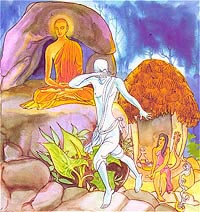
Verse 416. The Miracle
Rings
Who has
abandoned lusting here
as homeless one renouncing all,
with lust and being quite consumed,
that one I call a Brahmin True.
Explanation:
In this world, he has taken to the life of a wandering ascetic. He has got rid
of the craving to continue the cycle of existence. I describe that person as a
true brahmana.
Dhammapada Verse 416*
Jatilatthera Vatthu
Yo’dha
tanham pahantvana
anagaro paribbaje
tanhabhavaparikkhinam
tamaham brumi brahmanam.
Verse
416: Him I call a brahmana, who, in this world, has given up craving, and
leaving the home-life has become a bhikkhu; who has eradicated craving and has
come to the end of existence.
The
Story of Thera Jatila
While
residing at the Veluvana monastery, the Buddha uttered Verse (416*) of this
book, with reference to Thera Jatila.
Soon
after the passing away (Parinibbana) of Kassapa Buddha, an arahat thera went
round for donations to build a gold stupa where the relics of Kassapa Buddha
were to be enshrined. The thera came to the house of a goldsmith while he and
his wife were engaged in a heated quarrel. The goldsmith shouted at the thera
and said, “You had better thrown your stupa into the water and go away.”
His wife then said to the goldsmith, “If you are angry with me you should
abuse me only; you can even beat me if you like; but why do you have to abuse
the Buddha and the thera? Surely, you have done a grievous wrong!” Hearing
her words, the goldsmith realized the enormity of the wrong he had done and
wanted to make atonement for it. So, he made some gold flowers, put them into
three gold pots and offered them to be put into the relic chamber of the stupa
of Kassapa Buddha.
In his
present existence he was conceived in the womb of a rich man’s daughter who had
had an illicit love affair. When the child was born, she put it into a pot and
floated it down the stream. A young woman who was bathing in the stream saw the
child in the pot and took it with her. She adopted him and named him Jatila.
Later, on the advice of a thera the woman sent Jatila to Taxila where he had
his education. While at Taxila the thera arranged for him to stay at the house
of a merchant who was a disciple of his. In due course, Jatila married the
daughter of the merchant. Soon after the marriage, a large mound of gold
appeared in the backyard of the house which was newly built for the couple.
Three sons were born out of this marriage. After that, Jatila joined the Order
and attained arahatship within a few days.
On one
occasion, as the Buddha went on an alms-round with five hundred bhikkhus
including Jatila, they came to the house of the sons of Jatila. His sons
offered alms-food to the Buddha and his disciples for fifteen days. Some time
afterwards, the bhikkhus asked Jatila whether he was still attached to his
mound of gold and his sons, and he answered that he had no more attachment to
them. The bhikkhus then said to the Buddha that Jatila was falsely claiming to
have attained arahatship. To them the Buddha said, “Bhikkhus! Jatila
has got rid of craving and pride; he has indeed attained arahatship.“
Then
the Buddha spoke in verse as follows:
|
Verse 416: Him I call a |
* Verse
416 have two stories. Read the Story of Thera Jotika.
Dhammapada Verse 416*
Jotikatthera Vatthu
Yo’dha tanham pahantvana
anagaro paribbaje
tanhabhavaparikkhinam
tamaham brumi brahmanam.
Verse 416: Him I call a brahmana, who, in this
world, has given up craving, and leaving the home-life has become a bhikkhu;
who has eradicated craving and has come to the end of existence.
The Story of Thera Jotika
While residing at the Veluvana monastery, the
Buddha uttered Verse (416*) of this book, with reference to Thera Jotika.
Jotika was a famous rich man from Rajagaha. He
lived in a stately mansion with seven tiered pinnacles. There were seven walls
around his mansion, each of which had an entrance guarded by celestial demons.
The fame of his wealth spread far and wide, and many people came to see his mansion.
On one occasion, King Bimbisara came to visit Jotika; he also brought his son
Ajatasattu with him. Ajatasattu seeing the grandeur of Jotika’s mansion vowed
that he would not allow Jotika to live in such a magnificent mansion when he
became king. On the king’s departure from his house Jotika presented the king
with a large priceless ruby. It was the custom of Jotika to give presents to
all visitors who came to see him.
When Ajatasattu ascended the throne, after
killing his father, he came with his soldiers to take the mansion of Jotika by
force. But as all the gates were well guarded by celestial demons, Ajatasattu
and his soldiers had to retreat. Ajatasattu fled to the Veluvana monastery and
he found Jotika listening to a discourse given by the Buddha. Seeing Jotika at
the feet of the Buddha, Ajatasattu exclaimed, “After making your guards
fight me, you are now pretending to be listening to a discourse!” Jotika
realized that the king had gone to take his place by force and that he had been
compelled to retreat.
In a past existence, Jotika had made a solemn
wish that his property might not be taken away from him against his wish, and
this wish had been fulfilled. So Jotika said to King Ajatasattu, “O king!
My property cannot be taken away against my wish.” Saying this, he
stretched out his ten fingers and asked the king to take off the twenty rings
he was wearing on his fingers. The king tried hard to take them off but did not
succeed. Jotika then asked the king to spread out a piece of cloth and as Jotika
put his fingers on to the cloth, all his rings easily slipped off. After he had
given all his rings to King Ajatasattu, Jotika asked the Buddha that he might
be permitted into the Order. Soon after entering the Order, Jotika attained
arahatship.
One day, when other bhikkhus asked him whether
he had any more craving left in him for his mansion his wealth and his wife, he
answered that he did not have any more craving for them. The bhikkhus then went
to the Buddha and said, “Venerable Sir! Thera Jotika claims to have
attained arahatship; he is telling lies.” To them the Buddha said,
“Bhikkhus! Jotika speaks the truth; he does not have any more craving in
him. He is now an arahat.”
Then the Buddha spoke in verse as follows:
|
Verse 416: Him I call a brahmana, who, in this world, has |
* Verse 416 have two stories. Read the Story of Thera Jatila.
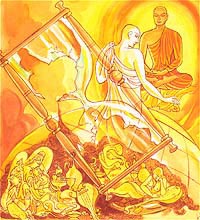
Verse 417. Beyond All
Bonds
Abandoned
all human bonds
and gone beyond the bonds of gods,
unbound one is from every bond,
that one I call a Brahmin True.
Explanation:
He has given up the bonds that bind him to humanity. He has gone beyond the
bonds of attachment to life in heaven as well. This way, he is disengaged from
all bonds. I declare such a person a brahmana.
Dhammapada Verse 417
Nataputtakatthera Vatthu
Hitva
manusakam yogam
dibbam yogam upaccaga
sabbayogavisamyuttam
tamaham brumi brahmanam.
Verse
417: Him I call a brahmana, who has given up attachment to (sensual pleasures
of) human life, has transcended attachment to (sensual pleasures of) deva life
and is completely free from all attachment.
The
Story of Thera Nataputtaka
While
residing at the Jetavana monastery, the Buddha uttered Verse (417) of this
book, with reference to Thera Nataputtaka, who was the son of a dancer.
Once,
the son of a dancer was going round the streets singing and dancing when he had
a chance to listen to a discourse given by the Buddha. After listening to the
discourse, he entered the Order and attained arahatship soon afterwards. One
day, while the Buddha and the bhikkhus including Nataputtaka were going on an
alms-round, they came across the son of another dancer dancing in the street.
Seeing the young man dancing, the other bhikkhus asked Nataputtaka whether he
still liked dancing. And Nataputtaka answered, “No, I do not.” The
bhikkhus then went to the Buddha and told him that Thera Nataputtaka was
falsely claiming to have attained arahatship. Thereby, the Buddha said, “Bhikkhus!
Nataputtaka has gone beyond all bonds of attachment; he has become an
arahat.”
Then
the Buddha spoke in verse as follows:
|
Verse 417: Him I call a |
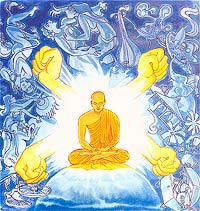
Verse 418. The Person
Whose Mind Is Cool
Abandoned
boredom and delight,
become quite cool and assetless,
a hero, All-worlds-Conqueror,
that one I call a Brahmin True.
Explanation:
He has given up lust. He has also given up his disgust for the practice of
meditation. This way, he is both lustful and lustres. He has achieved total
tranquillity. He is devoid of the blemishes that soil the hand. He has
conquered all the world and is full of effort. I call that person a brahmana.
Dhammapada Verse 418
Nataputtakatthera Vatthu
Hitva
ratim ca aratim ca
sitabultam nirupadhim1
sabbalokabhihhum2 viram
tamaham brumi brahmanam.
Verse
418: Him I call a brahmana, who has given up taking delight (in sensual
pleasures) and not taking delight (in solitude); who has attained perfect peace
and is free from moral defilements; who has overcome all the five khandhas
(lit., the world) and is diligent.
1.
nirupadhim: according to the Commentary, “nirupadhim ti
nirupakkilesam”, i.e., free from substratum or free from moral defilements
(kilesa).
2.
sabbalokabhihhum: lit., one who has conquered all the world, i.e., one who has
put an end to rebirths, or the arising of the khandhas.
The
Story of Thera Nataputtaka
While
residing at the Veluvana monastery, the Buddha uttered Verse (418) of this
book, with reference to another Thera Nataputtaka, son of another dancer.
As in
the previous story, the son of a dancer had entered the Order and had attained
arahatship. Other bhikkhus went to the Buddha and told him about Thera
Nataputtaka claiming to have attained arahatship. To them the Buddha said,
“Bhikkhus! Nataputtaka has given up taking delight in all things.”
Then
the Buddha spoke in verse as follows:
|
Verse 418: Him I call a
|
Dhammapada Verses 419 and
420
Vangisatthera Vatthu
Cutim
yo vedi sattanam
upapattinca sabbaso
asattam sugatam buddham
tamaham brumi brahmanam.
Yassa
gatim na jananti
deva gandhabbamanusa
khinasavam arahantam
tamaham brumi brahmanam.
Verse
419: Him I call a brahmana, who knows the death and rebirth of beings in every
detail, who is detached, who follows the good practice and knows the Four Noble
Truths.
Verse
420: Him I call a brahmana, whose destination the devas or gandhabbas or men do
not know who has eradicated moral intoxicants and is an arahat.
The
Story of Thera Vangisa
While
residing at the Jetavana monastery, the Buddha uttered Verses (419) and (420)
of this book, with reference to Thera Vangisa.
Once,
in Rajagaha, there was a brahmin by the name of Vangisa who by simply tapping
on the skull of a dead person could tell whether that person was reborn in the
world of the devas, or of the human beings, or in one of the four lower worlds
(apayas). The brahmins took Vangisa to many villages and people flocked to him
and paid him ten, twenty or a hundred to find out from him where their various
dead relatives were reborn.
On one
occasion, Vangisa and his party came to a place not far from the Jetavana
monastery. Seeing those people who were going to the Buddha, the brahmins
invited them to come to Vangisa who could tell where their relatives had been
reborn. But the Buddha’s disciples said to them, “Our teacher is one
without a rival, he only is the Enlightened One.” The brahmins took that
statement as a challenge and took Vangisa along with them to the Jetavana
monastery to compete with the Buddha. The Buddha, knowing their intention,
instructed the bhikkhus to bring the skulls of a person reborn in niraya, of a
person reborn in the animal world, of a person reborn in the human world, of a
person reborn in the deva world and also of an arahat. The five were then
placed in a row. When Vangisa was shown those skulls he could tell where the
owners of the first four skulls were reborn but when he came to the skull of
the arahat he was at a loss. Then the Buddha said, “Vangisa, don’t you
know? I do know where the owner of that skull is.” Vangisa then asked
the Buddha to let him have the magical incantation (mantra) by which he could
thus know; but the Buddha told him that the mantra could be given only to a
bhikkhu. Vangisa then told the brahmins to wait outside the monastery while he
was being taught the mantra. Thus, Vangisa became a bhikkhu and as a bhikkhu,
he was instructed by the Buddha to contemplate the thirty-two constituents of
the body. Vangisa diligently practised meditation as instructed by the Buddha
and attained arahatship within a short time.
When
the brahmins who were waiting outside the monastery came to ask Vangisa whether
he had acquired the mantra, Vangisa said, “You all had better go now; as
for me, I should no longer go along with you.” Other bhikkhus hearing him
thought he was telling lies, so they went to the Buddha and said,
“Venerable Sir! Vangisa is falsely claiming to have attained
arahatship.” To them the Buddha said, “Bhikkhus! Vangisa really
knows the death and rebirth of beings.”
Then
the Buddha spoke in verse as follows:
|
Verse 419: Him I call a |
|
Verse 420: Him I call a |
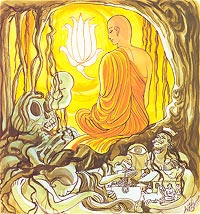
Verse 421. He Yearns For
Nothing
That
one who’s free of everything
that’s past, that’s present, yet to be,
who nothing owns, who’s unattached,
that one I call a Brahmin True.
Explanation:
Their path, neither gods, nor spirits, nor humans can fathom. Their taints are
totally eradicated. They have attained the higher spiritual state. This person
I declare a brahmana.
|
The Dhammapada: Verses |
Dhammapada Verse 421
Dhammadinna Theri Vatthu
Yassa pure ca paccha ca
majjhe ca natthi kincanam
akincanam anadnam
tamaham brumi brahmanam.
Verse 421: Him I call a brahmana, who does not
cling to the past, future and present khandha aggregates and who is free from
moral defilements and attachment.
The Story of Theri Dhammadinna
While residing at the Veluvana monastery, the
Buddha uttered Verse (421) of this book, with reference to Theri Dhammadinna.
Once, there was a lay-disciple of the Buddha
named Visakha in Rajagaha. After hearing the Buddha’s discourses again and
again Visakha attained Anagami Fruition and he said to his wife, “Please
accept all my property; from today, I’m not going to take part in any of the
affairs of the house.” His wife Dhammadinna retorted, “Who would
swallow the spittle you have thrown up?” Then she asked permission from
him to enter the Order and became a bhikkhuni. After becoming a bhikkhuni she
went to a monastery in a small village in the company of other bhikkhunis to
practise meditation. Within a short time, she attained arahatship and returned
to Rajagaha.
Visakha, hearing that Dhammadinna had
returned, went to see her and asked her some questions. When he asked her about
the first three maggas she answered him; but when he asked her questions
on the arahatta magga and phala she said, “O lay-disciple!
This matter is out of your depth; if you want, you may go and ask the
Buddha.” When Visakha asked the Buddha, the Buddha said,
“Dhammadinna has already answered your question. If you ask me I shall
have to give the same answer.” Saying this the Buddha confirmed the
fact that Dhammadinna had attained arahatship.
Then the Buddha spoke in verse as follows:
|
Verse 421: Him I call a brahmana, who does not cling to the |
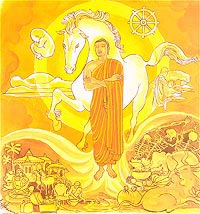
Verse 422. He Who Is Rid
Of Defilements
One
noble, most excellent, heroic too,
great sage and one who conquers all,
who’s faultless, washed, one Awake,
that one I call a Brahmin True.
Explanation:
He is a great sage as he has realized the essentials. He has conquered death.
He is devoid of blemishes. He has washed away all evil. He has awakener to the
essentials. That person, I describe as a brahmana.
Dhammapada Verse 422
Angulimatthera Vatthu
Usabham
pavaram viram
mahesim vijitavinam
anejam nhatakam1 buddham
tamaham brumi brahmanam.
Verse
422: Him I call a brahmana, who is fearless like a bull, who is noble and
diligent, who is a seeker of high moral virtues and a conqueror (of three
Maras), who is free from craving, who has been cleansed of moral defilements
and knows the Four Noble Truths.
1.
nhatakam: made clean (of moral defilements); an allusion to the ceremonial
bathing of the brahmin after finishing his course of studies.
The
Story of Angulimala
While
residing at the Jetavana monastery, the Buddha uttered Verse (422) of this
book, with reference to Thera Angulimala.
On one
occasion, King Pasenadi and Queen Mallika made an alms-offering to the Buddha
and his bhikkhus numbering five hundred in all, on a scale which could not be
surpassed by anyone else. At that ceremony, each bhikkhu was to have an
elephant holding a white umbrella over his head as a sunshade. However, they
could get only four hundred and ninety-nine trained elephants and so they had
to put in an untrained elephant and it was allotted to hold the umbrella over
Thera Angulimala. Every one was afraid that the untrained elephant might give
trouble, but when brought near Thera Angulimala it was quite docile.
It was
with reference to this incident that the bhikkhus later asked Angulimala
whether he did not get frightened or not. To this question Angulimala answered
that he was not frightened. The bhikkhus then went to the Buddha and said that
Thera Angulimala claimed to have attained arahatship. To them the Buddha said, “Bhikkhus!
It is quite true that Angulimala was not afraid; those who are like him are
also not afraid.”
Then
the Buddha spoke in verse as follows:
|
Verse 422: Him I call a
Verse 423. The Giver Who Explanation: |
Dhammapada Verse 423
Devahitabrahmana Vatthu
Pubbenivasam
yo vedi
saggapayanca passati
atho jatikkhayam patto
abhinnavosito muni
sabbavositavosanam
tamaham brumi brahmanam.
Verse
423: Him I call a brahmana, who knows past existences, who sees the celestial
as well as the lower worlds, who has reached the end of rebirths, who, with Magga
Insight, has become an arahat and has accomplished all that is to be
accomplished for the eradication of moral defilements.
The
Story of Devahita the Brahmin
While
residing at the Jetavana monastery, the Buddha uttered Verse (423) of this
book, with reference to Devahita, a brahmin.
On one
occasion, the Buddha suffered from a gastric ailment and he sent Thera Upavana
to get some hot water from Devahita the brahmin. The brahmin was very pleased
to have this rare opportunity to offer something to the Buddha. So, in addition
to hot water he also gave the thera some molasses for the Buddha. At the
monastery Thera Upavana gave a warm bath to the Buddha; after the bath he
offered the Buddha a mixture of molasses and hot water. After drinking the
mixture there was instant relief. The brahmin then came and asked the Buddha,
“Venerable Sir! An offering made to whom gives one the greatest
benefit?” To him the Buddha said, “Brahmin! An offering made to
one who has given up all evil is the most beneficial.”
Then
the Buddha spoke in verse as follows:
|
Verse 423: Him I call a |
At the
end of the discourse the brahmana became established in the faith in the Three
Gems (the Buddha, the Dhamma and the Samgha) and became a lay-disciple of the
Buddha.
End of
Chapter Twenty-six: The Brahmana
— End
of The Dhammapada: Verses and Stories —
